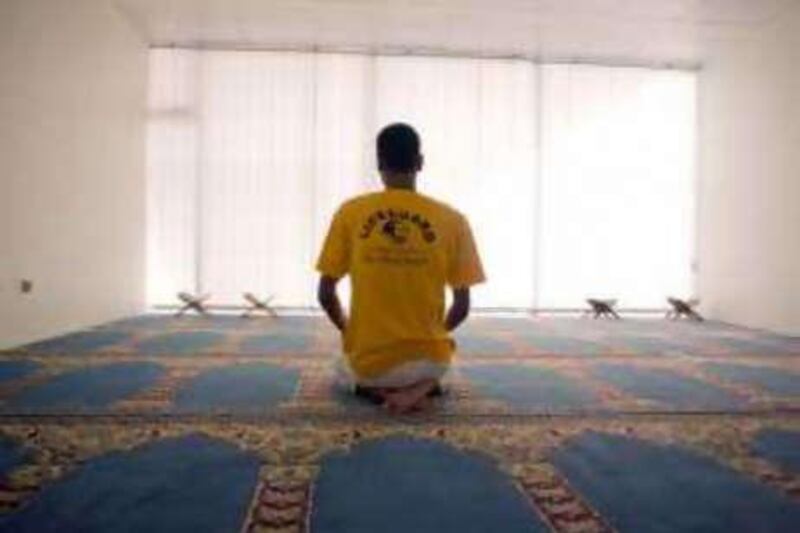ABU DHABI // The midday sun beats down on Khaled Sherbini Mohammed as he walks to his watchtower on Abu Dhabi Beach. As the head lifeguard he has a tough job, and fasting in the sun during Ramadan makes it tougher. But Mr Mohammed sees fasting as a gift that gives him time to contemplate his life and find clarity. "When you sit in the tower it is hot and you can't eat or drink, but God gives you the power to keep going," he says.
However, this Ramadan is somewhat bittersweet for Mr Mohammed, 28, from the Cairo suburb of Dokki, for another reason: he has yet to meet Habiba, his two-month-old daughter who was born a month after he left for Abu Dhabi. "I have never seen Habiba in person; it is very hard to never see my own baby and it makes me sad," he says. It is also the first Ramadan he has been away from his wife Shaima and their three-year-old daughter Aisha. Mr Mohammed has been in the country since the Corniche beach opened in July. His new home is a room he shares in Musaffah with several men. He gets up at 3.30am each day during the holy month to eat suhoor of bread and foul with water and Pepsi, before going back to sleep for an hour.
At 4.30am he gets up to pray before taking a bus to the beach for an 8am start as supervisor of 17 lifeguards, all from Egypt. "All day we patrol up and down, checking the water to see if there are any problems and if anyone is in the water," he says. "If there are no people in the water, then I sit and read the Quran." Mr Mohammed has memorised three of its 30 parts, with the aim of one day being able to recite the entire holy book: "When I read the Quran, if I am angry I become calm and relaxed. I don't feel angry, I feel peaceful and happy."
At around 12.20pm Mr Mohammed breaks for dhuhur prayer at the mosque on the beachfront. The beach is largely empty on weekdays during Ramadan, apart for a handful of dedicated tanners. However, Fridays are very busy, despite the still searing heat and the ban on eating or drinking in public. On this particular day, as the sun sets, food and boxes of water are carried into the main office. Mats have been placed on the floor for an iftar for the staff hosted by the management.
Lifeguards in their orange shirts set out biryani, salads, dates and luqaimat - an Emirati speciality - and sit waiting for the adhan's call for the end of the fast. "I really wanted the guys to experience a traditional Emirati iftar," a supervisor says. After murmurs of bismillah (In the name of God) they break their fasts with dates and water. Quiet falls as the men eat, while the few female employees break their fasts in the next room. Afterwards, Mr Mohammed goes outside to drink a Pepsi - one of his post-fasting rituals.
Normally, when their shift ends at 6pm, the lifeguards board a bus back to Musaffah and break their fast in their accommodation or, like Mr Mohammed, go to a restaurant. "There, I like to break my fast with fish biryani with my friends," he says. "After that we go to a coffee shop to drink tea and watch television." In Mr Mohammed's case his programme of choice is Rajel Wa Sit Sitta, or One Man and Six Women - a Ramadan television series. He then goes to the mosque for taraweeh prayers and to the market to buy food for suhoor.
Mr Mohammed says Ramadan in the UAE is a different experience from in Egypt. Sitting in the beach office, he paints a colourful picture of Ramadan in Cairo - children carrying traditional fanoos lanterns in the streets and singing songs, as well as visits to historic mosques. "I also love going to the Ramadan tents in Cairo where people sing and just are together," Mr Mohammed says. "I hope I can go home to Cairo to see them soon. I came here to make money for my family and I would like to one day bring them here."
zconstantine@thenational.ae






